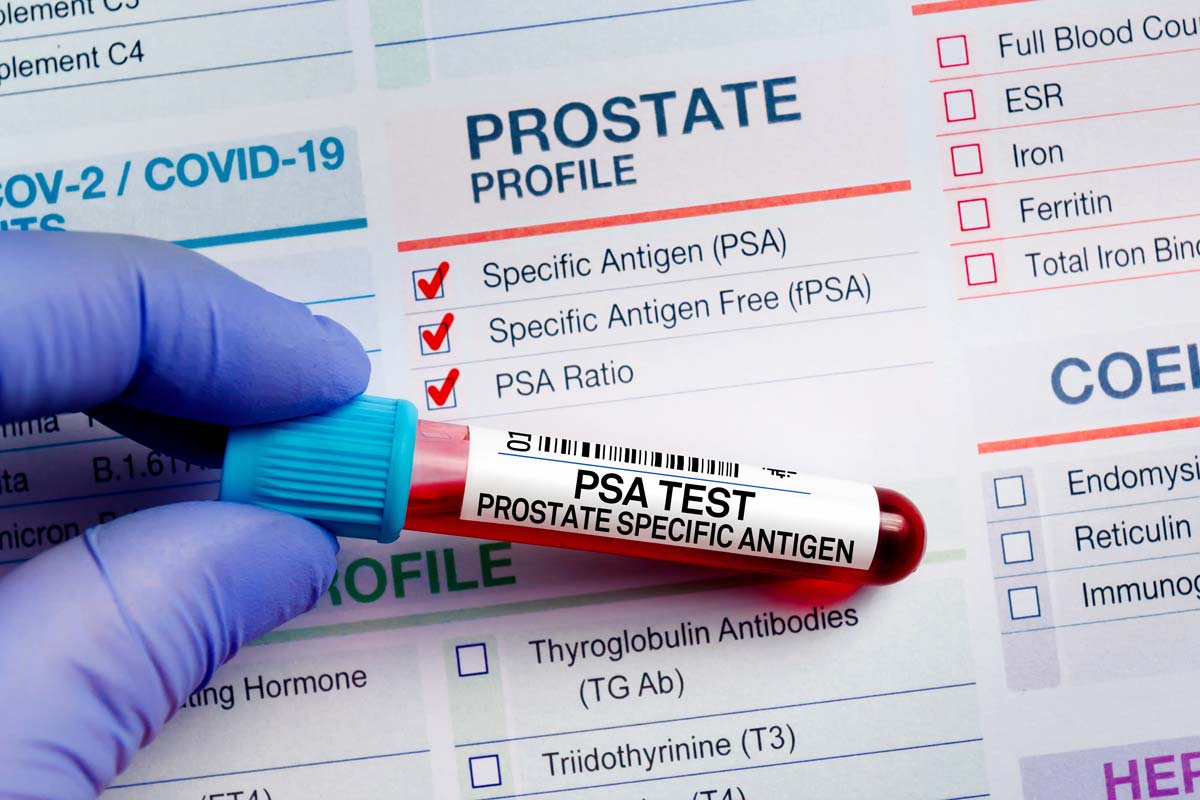Prostate-specific antigen (PSA) testing is a common method used to screen patients for prostate cancer and other conditions related to the prostate.
This simple blood test can indicate the presence of prostate cancer. However, false positive and false negative results can occur with PSA testing.
That is in part due to the variability of PSA levels on an individual basis. Non-cancerous conditions, certain activities, and individual genetic variations can all negatively influence accuracy when physicians interpret PSA results. Inflammation and infection can also have a significant impact on PSA levels.
Genetic analysis may play a valuable role in improving the accuracy of PSA testing for individuals. Keep reading to learn more about PSA testing, its limitations, and how genetic analysis could help to improve the efficacy of PSA tests.
Understanding PSA Tests and Their Role in Prostate Cancer Screening
Foundational Information About PSA Blood Tests
A PSA blood test is a tool used in prostate cancer screening. As the National Cancer Institute explains, the prostate produces a protein called prostate-specific antigen. PSA is present in both healthy men and men with prostate cancer.
PSA levels tend to rise when someone has prostate cancer. So, an elevated PSA level can indicate the presence of prostate cancer.
PSA testing is just one of many tools used to diagnose prostate cancer. This test is commonly used early on in the diagnostic process.
It’s often paired with a digital rectal exam (DRE) as a frontline diagnostic procedure. If the DRE, PSA blood test, or both indicate potential issues in the prostate, a physician may order a multiparametric MRI (mpMRI) as the next step in the workup. In the past, elevated PSA levels and abnormal findings during a DRE most commonly led to directly to a non-targeted prostate biopsy.
A variety of other medical conditions can cause elevated PSA blood levels as well. So, a PSA blood test result showing a high level of this protein is not conclusive by itself in diagnosing prostate cancer. We’ll explore the limitations and issues tied to PSA testing in the next section.
How PSA Tests are Conducted and Interpreted
PSA tests used to detect prostate cancer have a straightforward process. As with many other types of blood tests, all that’s required is a small blood sample. The results are reported as nanograms of PSA per milliliter of blood, commonly using the notation ng/mL.
There are two major factors involved in interpreting PSA blood test results. Namely, the PSA level as found by the test and the stability of that level over time.
PSA levels are variable from one person to the next, depending on age and many other factors. For example, the baseline PSA level for a man aged 40-49 is 0-2.5 ng/mL. For a man aged 60-69, the expected level is 0-4.5 ng/mL.
Some men naturally have higher PSA levels than others. And, as previously mentioned, other factors like noncancerous medical issues can cause elevated PSA levels. Tracking the amount of PSA present in blood over time is important for building a more thorough context.
Consistent readings over time that indicate a level of stability can be a sign that prostate cancer is not present, even when those levels are relatively high. Conversely, significant increases in PSA even when within the baseline “normal” range can be a cause for concern and further testing.
When PSA levels are steady over time, the following criteria may generally apply; however, we like to take a much more personalized approach than this:
- A reading between 0 and 2.5 ng/mL indicates that prostate cancer is not likely.
- A reading between 2.5 and 4.0 ng/mL is generally considered normal.
- A reading between 4.0 and 10.0 ng/mL is considered suspicious, and more testing may be conducted related to prostate cancer or other conditions that can elevate PSA levels.
- A reading above 10.0 ng/mL is generally considered dangerous and will lead to more testing for otherwise healthy men.
Potential Drawbacks and Limitations of PSA Testing
PSA tests can show an increased potential risk for prostate cancer, but PSA test results are not definitive. Importantly, a single PSA blood test can’t provide information about how PSA levels may have changed over time.
Even when a man receives consistent PSA testing, other factors unrelated to prostate cancer can lead to elevated PSA levels.
What Causes Elevated PSA Blood Levels?
Certain medical conditions, lifestyle factors, and other issues besides prostate cancer can cause elevated PSA blood levels. Examples of medical factors that can elevate PSA levels, as shared by the Institute for Quality and Efficiency in Health Care, include:
- Inflammation of the prostate, commonly called prostatitis.
- Urinary tract infections.
- Noncancerous enlargement of the prostate — benign prostatic hyperplasia.
Additionally, COVID-19 is known to cause elevated PSA levels. While not related to a specific medical condition, as men age over time and their bodies change, PSA levels generally increase.
Activities that impact the prostate can also increase the level of PSA found in a blood test. Examples include certain sports, like bike riding. Certain types of sexual activity and ejaculation in general can lead to an elevated PSA.
Some medical tests and treatments that involve the prostate, such as a prostate biopsy, can also elevate PSA levels. Testosterone replacement therapy can also lead to higher PSA levels.
Prostate cancer causes elevated PSA levels, but so do these factors. That’s part of why traditional PSA blood tests are only part of a much broader process for prostate cancer screening.
Overdiagnosis and Oversensitivity Related to PSA Testing
Peer-reviewed research published in The Journal of Family Practice notes that about 75% of positive PSA tests are false positives. When those PSA test results lead to additional testing and treatment that isn’t necessary, men are potentially exposed to harm. For example, prostate biopsies carry a risk of infection. And even a false positive test result by itself can lead to psychological harm.
The Institute for Quality and Efficiency in Health Care explains that, out of every 1,000 men who have a PSA blood test, roughly 3 will receive treatment that prevents prostate cancer from spreading (metastasizing) in the body and death due to cancer.
However, roughly 60 men will have cellular changes or slow-developing tumors identified that wouldn’t have led to health issues. This overdiagnosis can lead to psychological harm and unnecessary treatment, which can cause physical harm.
How Genetic Analysis Could Improve PSA Blood Test Accuracy
Genetic analysis may be a helpful complement to PSA blood tests. A peer-reviewed article from researchers at Stanford University, published in the journal Nature Medicine, explains that calibrating PSA tests to the individual can both reduce overdiagnosis and better identify aggressive cancer.
Stanford Medicine News Center explains that the researchers have developed a process to identify genetic variations that affect PSA levels through a simple germline genetic test conducted on blood, saliva, or cheek cells. With that information, medical professionals could then remove the genetic variation component present in standard PSA tests and gain a better understanding of prostate cancer risks for individual patients.
As the American Association for Cancer Research explains, applying this concept to a group of real-world participants in a Kaiser Permanente research cohort led to positive results. Taking genetically adjusted PSA levels into account would have meant avoiding about 20% of biopsies for participants without prostate cancer.
Additionally, the adjusted PSA score would have led to a 15.7% reduction in biopsies for patients with low-grade, slow-developing cancer. In many of these cases, aggressive treatment isn’t needed.
The National Cancer Institute reports that its own funded research identified and validated an improved urinary biomarker test for screening prostate cancer patients with elevated PSA blood test results. This test, called MyProstateScore version 2.0 (MPS2), assesses 18 genetic markers associated with prostate cancer to better predict clinically significant instances of this disease. It’s a significant step forward from the original MyProstateScore test, which looks at two genetic markers.
MPS2 can provide more context to clinicians without invasive testing such as a biopsy. It can help physicians better understand if more invasive testing is the right approach for each individual patient showing elevated PSA levels.
More Notable Advances in Prostate Cancer Screening and Diagnosis
High-quality MRI, such as multiparametric MRI (mpMRI), also plays a key role in better understanding the state of prostate cancer and the need for prostate cancer treatment.
Used on its own, it helps clinicians better understand the presence and location of potentially cancerous cells. When used to guide a biopsy procedure, mpMRI empowers the targeted selection of cell samples, resulting in a more accurate diagnosis. That’s a notable improvement compared to the randomized nature of traditional transrectal ultrasound-guided (TRUS) biopsies, as research published in The New England Journal of Medicine explains.
Every meaningful improvement in prostate cancer screening and diagnosis ultimately benefits patients. Through genetic testing, the results of PSA blood tests can improve for individual patients, helping them and their clinicians better understand the state and severity of their disease. Similarly, mpMRI offers crucial context to clinicians and patients, both through the reading of imaging by itself and its role in more targeted biopsies.
Treating Prostate Cancer with Effective, Minimally Invasive Options
Prostate Laser Center uses minimally invasive treatment options, along with mpMRI, to support the health of qualifying patients. Our objective is to reduce unnecessary harm through effective and targeted screening, as well as provide treatment options that offer reduced risks of side effects.
Seeking treatment for prostate cancer? Schedule a consultation today.
NOTE: The information provided on this website is general medical information and does not establish a physician-patient relationship. Please discuss your particular situation with a qualified medical professional.



